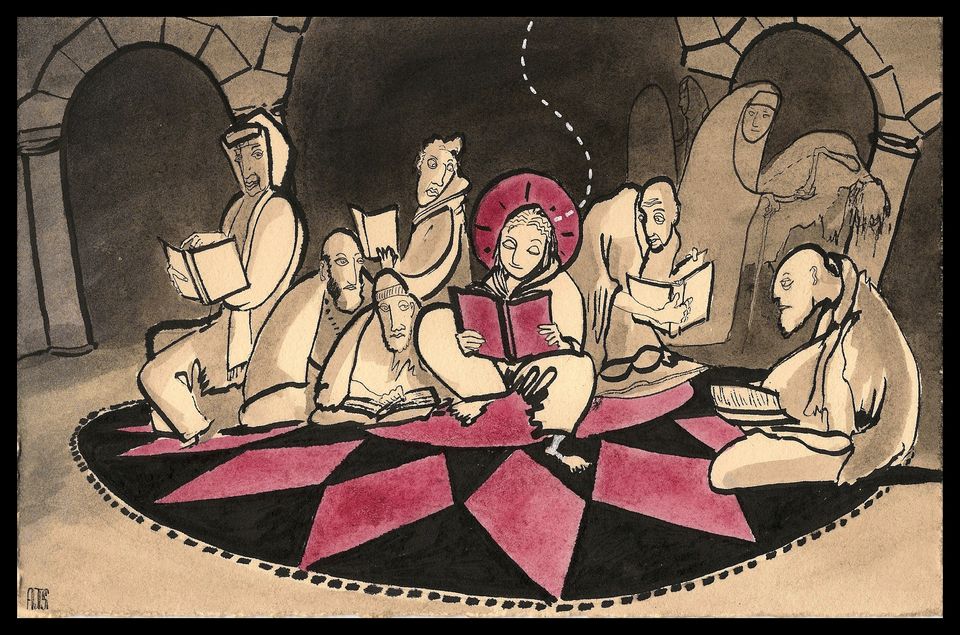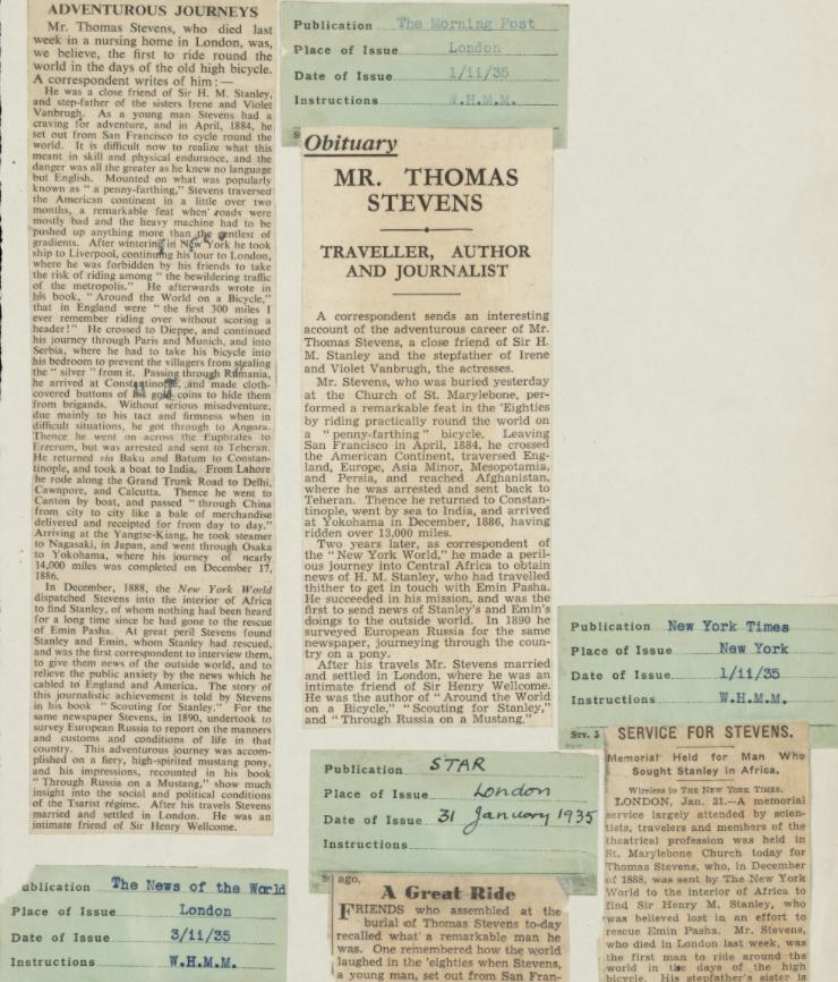Instead of a “best of” list we asked our editors and staff writers to share the books, movies, or music they loved in 2014. What they contributed didn’t have to be from 2014. And so here we have a personal mix of beloved cultural artifacts (a lot of which are books). Part II will be published tomorrow, and this piece was illustrated by Milwaukee artist Adam Stoner.

Carolyn Givens
There’s a moment, at the very, very end of Andrew Peterson’s The Warden and the Wolf King that you suddenly realize what might happen, and what incredible joy that “might” would bring. It’s basically the final sentence of the book, but your heart leaps for what’s next. Peterson’s brother, A.S. “Pete” Peterson, also an author, once spoke about authors who leave a signpost on their final page, as if saying, “The story goes on…that way.” Even if the book had been dull (it wasn’t) or hadn’t finished out The Wingfeather Saga well (it does), I think it might have been worth the read just for that one moment of hope and joy.
I’ve been meaning to read Unbroken for about four years now. I loved Hillenbrand’s Seabiscuit and knew she could do justice to a true tale. But with the movie looming on the horizon, reading Unbroken became an urgent matter. I needed to get the story straight in my head before I saw it acted out before me. Hillenbrand manages again to bring to vivid life a decades-old story.
I’d only read Jonathan Rogers’ short fiction before picking up The Charlatan’s Boy this spring. But I knew I was in for a treat. Rogers can spin a tale—full of feechies and swamps and the lovely lilt of his dialogue. Grady is an orphan boy looking for the truth of who he is and where he came from, and his guardian is, in Grady’s own words “a liar and a fraud.” Grady’s adventure is full of fun, full of heart, and a balm for anyone who has ever searched for where they belong.

Trevor Logan
The poetry of Toby Martinez de las Rivas has been my gold among the dross this year. His recent collection Terror will stay close by for what I hope is forever. There is something eternal about his poetry. And then there’s Oliver Ready’s wonderful translation of Dostoevsky’s Crime and Punishment; Ready’s rendition of Raskolnikov’s stochastic moods is as raw as ever, and now perpetually lodged in my consciousness. Lastly, David Marquand’s Mammon’s Kingdom: An Essay on Britain, Now is necessary reading for anyone concerned with how we became such strong votaries of Mammon’s “melancholy creed,” as Thomas Carlyle put it.

Tessa Carman
Each essay in Leslie Jamison’s The Empathy Exams could be described as a carefully woven elaboration upon Terence’s assertion that “nothing human is alien to me” (the book’s epigraph). It’s a book that deserves a slow, attentive read, but is also incredibly hard to put down.
William Gaunt’s novelistic The Pre-Raphaelite Dream is a lovingly crafted and tragic account of the Pre-Raphaelite Brotherhood: the lives, loves, and losses of Rossetti, Burne-Jones, Morris, Holman Hunt, and others. Their quixotic dreams are still relevant and relatable, it seems to me, and that is perhaps part of the tragedy of their tale.
The theme of home—homemaking, leaving home, homecoming—came up a lot in my reading this year: Rod Dreher’s The Little Way of Ruthie Leming, Marilynne Robinson’s Housekeeping and Home, Annie Dillard’s An American Childhood, Sarah Orne Jewett’s The Country of the Pointed Firs. Looking back, I realize this may have been (subconsciously) intentional, since the question of home-creating became especially meaningful for me this year.

Charity Singleton Craig
“Are we missing our lives by obsessing over our souls?” So wrote Jess Mesman Griffith in a letter to Amy Andrews in the epistolary memoir, Love & Salt: A Spiritual Friendship Shared in Letters. After strong recommendations from several friends, I wasn’t sure a book of letters about faith, marriage, and career by two graduate students could live up to its hype. But in the process of reading letter after letter— first exchanged daily each year during Lent, but then crossing seasons and years, chronicling births and deaths, unearthing the past and hoping for the future—Amy and Jess became my friends. Their letters to each other became a note written to include me, as well.
If you know E.B. White only as the author of the children’s favorite, Charlotte’s Web, then get to know the rest of the man through his Essays of E.B. White. The chapter called, “Geese,” is worth the price of his book. “Winter is a time of waiting, for man and goose,” he writes as he plots to comfort his grieving gander. In the end, his tinkering has created a greater sadness for the gander, a sadness White feels acutely himself. “I don’t know anything sadder than a summer’s day,” he writes.

Laura Tokie
I read The Assassination of Jesse James by the Coward Robert Ford by Ron Hansen for the first time this fall. Published in 1983, Hansen tells a 100+ year old story of these two complicated men, their associates, and their families. It took me several pages to adjust to the pace of the detail-rich narrative, but once I settled into it, themes including celebrity worship and image manipulation seemed both timeless and timely.
In nonfiction, I recommend The Good Funeral: Death, Grief, and the Community of Care by Thomas G. Long and Thomas Lynch. While some of this work is geared for funeral directors and clergy (and I am neither), I found it touching, moving, and troubling in the best way: stirring thoughts about honoring life and acknowledging death physically. I read it in June. A month later, the ideas in it brought shape and comfort to a blurred summer of grief.

Andy Scott
Tales about prodigals returning home are as old as the Bible. What is remarkable about Teju Cole’s Every Day is for the Thief is that the story feels genuinely new. Written from a semi-autobiographical perspective, Every Day is for the Thief is a captivating series of short excerpts about life vis-a-vis a man’s re-entry into Nigeria after 15 years. Tired as the genre may be, Cole gives a startling new breath to an examination of existence through concise, poignant narration. Chapters are never more than a few pages, and offer only snapshots of the simultaneous disorientation and joy of rediscovering home.
I finally got around to reading George Saunders’ Civilwarland in Bad Decline. Being somewhat familiar with his style, this was something I had looked forward to, and spent many days reading. Saunders carries the ability to inject the absurd with a dose of humanity with such accuracy that you forget Downtrodden Mary is fictional. While his writing is a dark shade of humorous, it’s also rooted in a deep understanding of what drives humanity to those dark yet funny places. Civilwarland in Bad Decline is at once who we are and who we might very well become.
Icelandic post-rock is great. It could merely be a symptom of my stunted musical development, but Sigur Rós is still the reigning champion of my iTunes account. There is a new contender from the tundra now. Ásgeir, who I’d describe as the Icelandinc Bon Iver, was a welcome addition to my collection and has been playing on repeat from many months. He brings a depth of sound and melody that pairs well with lyrics written by his father. If I were Icelandic I’d be accused of bandwagoning– the album is now the best-selling album of all time– but I’m not, so do yourself a favor and check it out.




